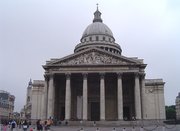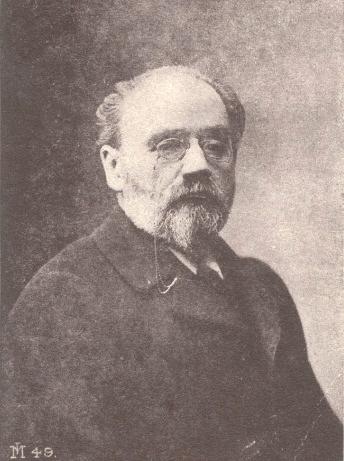|
|
Émile Zola (April 2, 1840 – September 29, 1902) was an influential French novelist of Jewish origin, the most important example of the literary school of naturalism, and a major figure in the political liberalization of France.
Missing image Emile_Zola.jpg Émile Zola |
Missing image Grave_of_Emile_Zola.JPG Gravestone of Emile Zola at cimétière Montmartre, he was transferred to the Pantheon later on |
 The Pantheon is the current restplace of Émile Zola |
Born in Paris, France, the son of an Italian engineer, Émile Zola spent his childhood in Aix-en-Provence and was educated at the Collège Bourbon. At age 18 he returned to Paris where he studied at the Lycée Saint-Louis. After working at several low-level clerical jobs, he began to write a literary column for a newspaper. Controversial from the beginning, he did not hide his disdain for Napoleon III, who used the Second Republic as a vehicle to become Emperor.
More than half of Zola's novels were part of a set of 20 collectively known as Les Rougon-Macquart. Set in France's Second Empire, it traces the hereditary influence of violence, alcoholism, and prostitution in two branches of a family, the respectable Rougons and the disreputable Macquarts, for five generations.
As he described his plans for the series, "I want to portray, at the outset of a century of liberty and truth, a family that cannot restrain itself in its rush to possess all the good things that progress is making available and is derailed by its own momentum, the fatal convulsions that accompany the birth of a new world."
Zola and the painter Paul Cezanne were friends from childhood and in youth, but broke in later life over Zola's fictionalized depiction of Cezanne and the bohemian life of painters in his novel L'Oeuvre (The Masterpiece, 1886).
He risked his career and even his life on January 13, 1898, when his J'accuse (original French (http://sources.wikipedia.org/wiki/J%27accuse) English translation (http://www.chameleon-translations.com/sample-Zola.shtml)) was published on the front page of the Paris daily, L'Aurore. The paper was run by Ernest Vaughan and Georges Clemenceau, who decided that the controversial story would be in the form of an open letter to the President, Félix Faure. J'accuse accused the French government of anti-Semitism and of wrongfully placing Alfred Dreyfus in jail. Zola was brought to trial for libel for publishing J'Accuse on February 7, 1898 and was convicted on February 23. Zola declared that the conviction and transportation to Devil's Island of the Jewish army captain Alfred Dreyfus came after a false accusation of espionage and was a miscarriage of justice. The case, known as the Dreyfus affair, had divided France deeply between the reactionary army and church and the more liberal commercial society. The ramifications continued for years, so much so that on the 100th anniversary of Émile Zola's article, France's Roman Catholic daily paper, "La Croix", apologized for its anti-Semitic editorials during the Dreyfus affair.
Manet,_Edouard_-_Portrait_of_Emile_Zola.jpg
Zola was a leading light of France and his letter formed a major turning-point in the Dreyfus affair, causing the captain's case to be reopened, whereupon he was acquitted. In the course of events, Zola was convicted of libel, sentenced, and removed from the Legion of Honor. Rather than go to jail, he fled to England. Soon he was allowed to return in time to see the government fall. Dreyfus was convicted again, but was ultimately freed, in large part due to the moral force of Zola's arguments. Zola said "The truth is on the march, and nothing shall stop it." In 1906, Dreyfus was completely exonerated by the Supreme Court.
Zola died in Paris on September 29, 1902 of carbon monoxide poisoning caused by a stopped chimney. His enemies were blamed, but nothing was proved. He was initially buried in the Cimetière de Montmartre in Paris, but on June 4, 1908, almost six years after his death, his remains were moved to the Panthéon.
On January of 1998 President Jacques Chirac held a memorial to honor the centenary of J'Accuse.
Quotes
"Let us never forget the courage of a great writer who, taking every risk, putting his tranquility, his fame, even his life in peril, dared to pick up his pen and place his talent in the service of truth." - Jacques Chirac
"Zola descends into the sewer to bathe in it, I to cleanse it." - Henrik Ibsen
"Civilization will not attain to its perfection until the last stone from the last church falls on the last priest." - Émile Zola
Bibliography
- La Confession de Claude (1865)
- Thérèse Raquin (1867)
- Madeleine Férat (1868)
- Le Roman Experimental (1880)
- Les Rougon-Macquart
- La Fortune des Rougon (1871)
- La Curée (1871-2)
- Le Ventre de Paris (1873)
- La Conquête de Plassans (1874)
- La Faute de l'Abbé Mouret (1875)
- Son Excellence Eugène Rougon (1876)
- L'Assommoir (1877)
- Une Page d'amour(1878)
- Nana (1880)
- Pot-Bouille (1882)
- Au Bonheur des Dames (1883)
- La Joie de vivre (1884)
- Germinal (1885)
- L'Oeuvre (1886)
- La Terre (1887)
- Le Rêve (1888)
- La Bête Humaine (1890)
- L'Argent (1891)
- La Débâcle (1892)
- Le Docteur Pascal (1893)
Motion Picture: The Life of Emile Zola, directed by William Dieterle:
- 1937 Academy Awards: Best Picture, Best Supporting Actor (Schildkraut), Best Screenplay;
- 1937 Academy Awards Nominations: Best Actor (Muni), Best Director (Dieterle), Best Interior Decoration, Best Sound, Best Story, Best Original Score.
- Featured Actors: Paul Muni, Gale Sondergaard, Joseph Schildkraut, Gloria Holden.
External Links
- Full text of Zola's books (http://www.gutenberg.org/catalog/world/authrec?fk_authors=528) from Project Gutenberg
- "J´accuse ...! (http://www.law.uga.edu/academics/profiles/dwilkes_more/his9_jaccuse.html) Emile Zola, Alfred Dreyfus, and the greatest newspaper article in history", by Donald E. Wilkes Jr. from Flagpole Magazine
- Family tree of the Rougon-Macquart families (http://www.francealacarte.org.uk/education/enseigner/ressources/alevel/litterature/zola/arbre.html)
Template:Wikiquote Template:Wikisource authorbg:Емил Зола cs:Émile Zola da:Émile Zola de:Émile Zola es:Émile Zola fr:Émile Zola ko:에밀 졸라 he:אמיל זולא nl:Émile Zola ja:エミール・ゾラ pl:Émile Zola pt:Émile Zola ru:Золя, Эмиль fi:Émile Zola sv:Émile Zola

